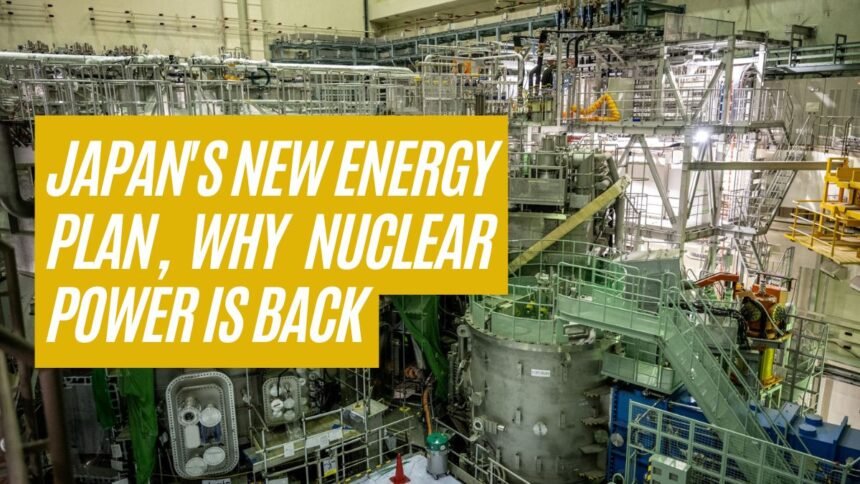Japan’s new Prime Minister, Sanae Takaichi, is expected to aggressively revive nuclear power to address rising inflation, a major source of public discontent. Restarting reactors is crucial to reducing the country’s reliance on expensive fuel imports. This move marks a significant shift in energy policy following the 2011 Fukushima disaster.
Takaichi has appointed Ryosei Akazawa, previously the country’s lead figure in the country’s most recent trade agreement with the United States, as the new minister of trade and industry, whose portfolio includes energy. Analysts say this appointment signals a willingness to cooperate with Washington, particularly on the purchase of liquefied natural gas (LNG).
Her government is preparing an energy purchase package to present to US President Donald Trump during his visit to Tokyo next week, including LNG, Reuters reported on Wednesday. However, the plan currently excludes LNG from the Alaska pipeline project, a key initiative supported by Trump.
“We aim to continue the recovery of nuclear energy while taking concrete steps to gain the necessary understanding from local communities and stakeholders,” Akazawa said Wednesday, emphasizing the importance of energy security and decarbonization through resource diversification.
Last year, Japan spent 10.7 trillion yen ($71 billion) on LNG and coal imports, accounting for a tenth of its total import bill. These imported fossil fuels currently supply 60% to 70% of Japan’s electricity generation, contributing significantly to inflation that has eroded support for the ruling Liberal Democratic Party.
Henning Gloystein, managing director of the consulting firm Eurasia Group, believes a nuclear upgrade is imminent. “PM Takaichi will almost certainly push for a more ambitious restart of nuclear reactors. This is partly to support his efforts to lower wholesale electricity prices and reduce reliance on fuel imports,” he explained.
Before the Fukushima disaster, Japan operated 54 nuclear reactors. Of the 33 still operating, only 14 have been restarted, a process that can take years due to stringent safety regulations and public concerns. Ensuring a stable supply of new electricity is increasingly urgent as demand is projected to increase with the expansion of data centers.
Takaichi, a staunch supporter of nuclear power, including next-generation fusion energy, has also voiced his support for perovskite solar cells, a technology Japan has the potential to export. On the other hand, he has expressed opposition to large-scale solar projects, citing their reliance on panels imported from China and their potential environmental impact.
According to industry insiders, expensive, large-scale renewable energy projects, such as offshore wind farms, are likely to receive less political support from the Takaichi administration, especially after Mitsubishi withdrew from the project.
“Takaichi…in the long run, he likely won’t provide much support for the industry, as he favors a recovery with nuclear power,” said an industry source involved in offshore wind policy discussions.
Ahead of President Trump’s visit, US Treasury Secretary Scott Bessent has urged Tokyo to halt purchases of Russian energy, particularly liquefied natural gas (LNG), which accounts for 9% of Japan’s total LNG imports.
While Japan has downplayed political pressure, it has signed new US LNG purchase deals this year but stopped short of committing to the $44 billion Alaska LNG project, under a broader bilateral trade agreement negotiated by Akazawa.
“His ability to maintain dialogue with the US government, including on energy issues, is a positive factor,” said a senior official at a major Japanese utility company, speaking on condition of anonymity.
Tom O’Sullivan, director of Mathyos Global Advisory in Tokyo, emphasized Akazawa’s understanding of the importance of affordable energy. Akazawa, a 64-year-old English speaker, is seen as uniquely positioned to navigate the complex energy landscape.
“There is also international pressure on Japan to halt LNG purchases from Sakhalin, so this will also put pressure on Japan to accelerate the restart of nuclear power plants,” O’Sullivan added.
However, most of the Sakhalin-2 LNG contracts are set to expire between 2028 and 2033, and early termination would result in significant fines for Japanese buyers, analysts say.
Japan’s nuclear power revival represents a significant turning point in the country’s energy policy, driven by economic pressures and a renewed focus on energy security. The success of this policy will depend heavily on the government’s ability to respond to public concerns and navigate complex international relations.












